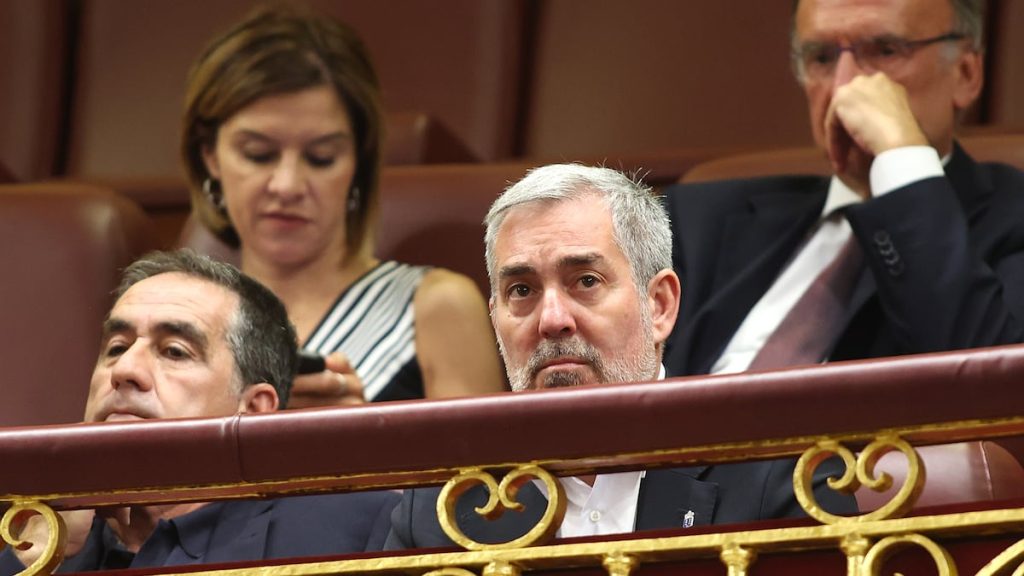The latest plenary session in the Congress of Deputies addressed on Tuesday the reform of the immigration law, with the PSOE seeking mandatory distribution of minor migrants among regions when one autonomous community has exceeded its capacity. The reform does not have enough support despite the attempts of the socialists to push it through last minute. Both the PP and Junts have confirmed that they will not support it. “It’s a ‘I distribute and you figure it out’ situation,” said PP spokesperson Ana Isabel Alós. Junts spokesperson Míriam Nogueras explained her group’s rejection of a reform that “does not provide tranquility or security”. The Popular Party and Coalition Canaria (CC) have requested during the debate that the proposal be withdrawn, something the government does not consider. “If there is no agreement in the next few hours, I will ask for it not to be voted on, to remain on the table and continue discussing,” said Cristina Valido (CC). Additionally, the renewal of the Judiciary with the PP is being voted on. And the extension of measures to address the economic and social consequences of conflicts in Ukraine and Gaza, a point that Podemos announced on Tuesday that they will support.
In another news, Boris Johnson has announced that the British government plans to further ease Covid-19 restrictions in England on July 19th, moving from legal restrictions to personal responsibility. This means that the mandatory use of face masks and social distancing will no longer be required, and nightclubs will be allowed to reopen. Johnson stressed the importance of vaccination in this new phase of the pandemic and encouraged people to get vaccinated to protect themselves and others. The decision has received mixed reactions, with some experts warning of the risks of allowing the virus to spread freely, while others argue that with high vaccination rates, transmission rates should fall.
On the other hand, the situation in Cuba continues to escalate, with ongoing protests against the government and shortages of food and medicine in the country. The United States, the European Union, and other countries have expressed their support for the Cuban people, calling for dialogue and respect for human rights. The Cuban government, on the other hand, has blamed the protests on US interference and imposed internet restrictions to limit the flow of information. The international community is closely following the situation, hoping for a peaceful resolution to the crisis and for the Cuban people to have their voices heard.
In the sports world, the Tokyo Olympics are set to begin amidst controversy and uncertainty due to the Covid-19 pandemic. The games, originally scheduled for 2020, have been postponed and will now take place in a restricted format, with no spectators allowed from abroad. Athletes and officials participating in the Olympics will be subject to strict health protocols and daily testing to prevent the spread of the virus. Despite the challenges, the athletes are determined to compete and showcase their skills on the global stage. The Olympics are also expected to be a moment of unity and solidarity among nations, bringing together athletes from around the world in the spirit of sportsmanship and fair play.
In the entertainment industry, the release of highly anticipated films and TV shows has been affected by the pandemic, with many productions delayed or canceled. However, streaming platforms have seen a surge in viewership, with people turning to online content for entertainment during lockdowns. Popular series like “Bridgerton” and “The Crown” have captivated audiences worldwide, while movies like “Nomadland” and “Soul” have received critical acclaim. The pandemic has forced the entertainment industry to adapt to new challenges and opportunities, exploring virtual formats and digital distribution channels to reach audiences in a changing landscape. Despite the setbacks, the industry remains resilient and continues to innovate and create new content for audiences to enjoy.
In conclusion, the world is facing a period of transition and change, with political, social, and economic challenges requiring thoughtful and decisive action. From immigration reform in Spain to the Covid-19 pandemic and international crises, the global community is called upon to work together to address pressing issues and build a more sustainable and inclusive future. As we navigate these uncertain times, it is important to stay informed, engaged, and united in our efforts to create a better world for all. Together, we can overcome obstacles and shape a brighter tomorrow for generations to come. Let’s continue to seek solutions, foster understanding, and strive for a more just and equitable society for all.


